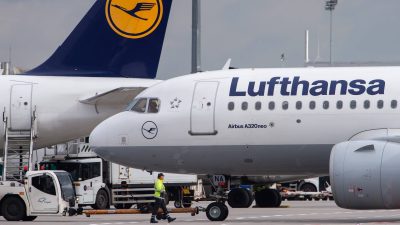Lufthansa faces backlash for offloading 45 Abuja-Frankfurt passengers

Lufthansa Airlines is facing scrutiny after it offloaded 45 passengers from its Abuja-Frankfurt flight last week, citing safety concerns due to runway limitations at the Nnamdi Azikiwe International Airport, Abuja.
The incident, which occurred on a Lufthansa Airbus A330-300 en route to Frankfurt, has sparked criticism in the aviation industry, particularly over the airline’s handling of information regarding the runway condition.
Officials in aviation agencies, who refused to give their names because they were not officially empowered to speak on the matter, confirmed to our correspondent that a Notice of Airmen had earlier been sent to the airline just as it was also sent to all operators about a damaged section of the 3,610-meter Abuja runway.
According to the officials, the notice, dated July 23, also included GPS coordinates and advised airlines to adjust operations during planned nighttime repairs.
The PUNCH, however, gathered that Lufthansa Airlines last Wednesday offloaded 45 passengers and all the luggage of about 200 passengers fully booked for the Abuja-Frankfurt flight to reduce the weight of the aircraft so that it could take off from a shorter length of the runway.
The airline blamed the development on a combination of rain, tailwind, and the shortened take-off distance of the runway. The airline acknowledged receiving the letter notifying it of the palliative works and the notice in its letter to FAAN.
Following backlashes over the development, the airline wrote to the Federal Airport Authority of Nigeria, explaining that, “Due to weather conditions and in the interest of safety, we had to reduce the aircraft’s weight”, adding that.
It had factored in the repair works at the airport. It emphasised that the action was not due to any lapse in communication from airport authorities.
However, the move drew criticisms from aviation experts and stakeholders who questioned why Lufthansa alone appeared to struggle with the situation when other airlines operated similar wide-bodied aircraft under the same conditions.
According to a breakdown of aircraft traffic in Abuja airport obtained by The PUNCH, British Airways (Boeing 777), Qatar Airways (Boeing 787), and Turkish Airlines (Airbus A330), among others, all conducted normal operations with full passenger loads.
Ethiopian Airlines, Egypt Air, Royal Air Maroc, and Air France were also said to have flown in and out without a reported incident.
Travel consultant Botunde Dele criticised what he described as an attempt to deflect responsibility, adding that “Blaming the airport authority in this case is ill-conceived. Lufthansa was not the only airline operating that day, and others did not have the same issue. Any NOTAM issued is shared globally, so a pilot claiming ignorance would be highly questionable.”
A FAAN engineer, who spoke on condition of anonymity, confirmed that the runway’s damaged section was promptly repaired and that full operations have since resumed at the airport.
He said, “These things happen occasionally in aviation. We acted fast, informed the airlines, and carried out the repairs. The full runway is now operational again.”
The expert added that Lufthansa’s A330-300, a wide-body jet, typically requires a longer runway for safe takeoff, especially under wet conditions or with tailwinds.
While a minimum takeoff distance for the aircraft can be around 2,500 meters, this figure is subject to operational variables such as total weight, elevation, and weather.
In light of the comprehensive notice given by FAAN and NAMA, the aviation professional believed that Lufthansa may not have adequately adjusted its operational planning for the conditions in Abuja.
“Lufthansa needs to explain why, despite the warning, they attempted a full-load take-off,” said one industry analyst. “This was an operational miscalculation, not a communication failure on Nigeria’s part.”

